Supplemental Homework in Introductory Physics Courses
–M.M. Jarrio
The one who does not remember history is bound to live through it again.
–George Santayana
It is a common practice for Introductory Physics instructors to set up the online homework system to include Supplemental (or Bonus) Assignments, over and above the required minimumhomework load. It is a common practice for Introductory Physics students to ignore this extra homework, assuming that the cost-to-benefit ratio does not justify the extra effort. Below, you will see a compilation of actual data regarding the impact of such extra homework on student performance. Before you make any assumptions about the value of doing these assignments, you should take some time to look over this information.
The information below is based on MasteringPhysics records for over 2500 students taking PHYS 2212 between Fall 2005 and fall 2008. Although not included where, data prior to 2005 and data since 2008 show nearly identical trends—as does the data for 2211 students.
Preliminaries
In all of the terms under consideration, the homework system was structured to require small, daily assignments (3 to 4 problems), along with larger, optional assignments (8 to 10 additional problems) due at the end of each week. (This is precisely the same structure that you will be seeing this term.) In some cases, the extra assignments have been awarded a small amount of bonus credit–typically no more than two percentage points at term's end; certainly not enough by itself to make a huge difference in anyone's final grade.
We can group students into one of three categories, based upon how often they opened up one of the extra assignments and made some sort of effort to work some of the problems. The breakpoints for these categories were determined by looking at final grade data for all students, going back to 2004 (when the MasteringPhysics system was first adopted).
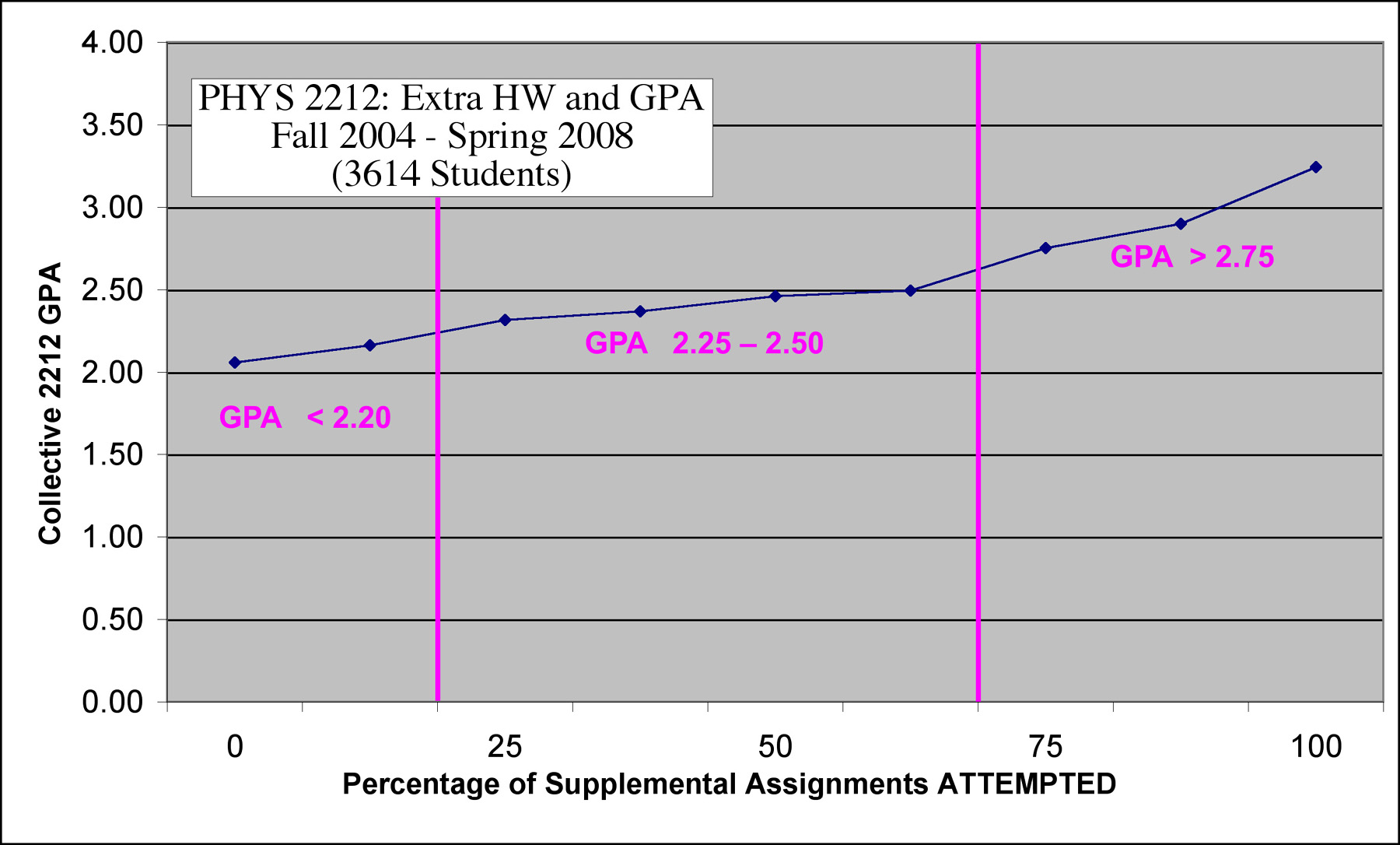
Good - make a non-zero effort on 75% or more of extra assignments
Fair - make a non-zero effort on 25% to 74% of extra assignments
Poor - make a non-zero effort on less than 25% of extra assignments
Note well: this study is NOT based on the SCORES that students earned on these assignments. All that matters is whether or not, in a given week, a student opened up the extra assignments, and did anything that earned some credit. In other words, working ONE extra problem EACH week would be characterized as a Good effort, since 100% of the extra assignments would have a non-zero score!
Extra Homework & Grade Distributions
Looking only at our database (Fall 2005 and later), it is instructive to look at the letter grade distributions for students in each of the three homework categories:
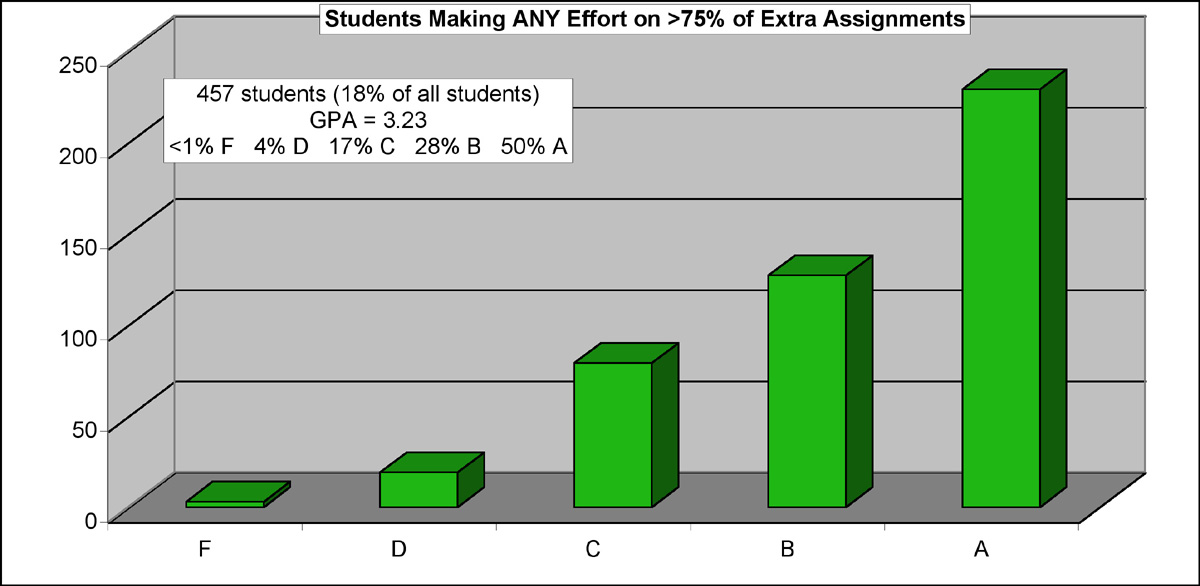
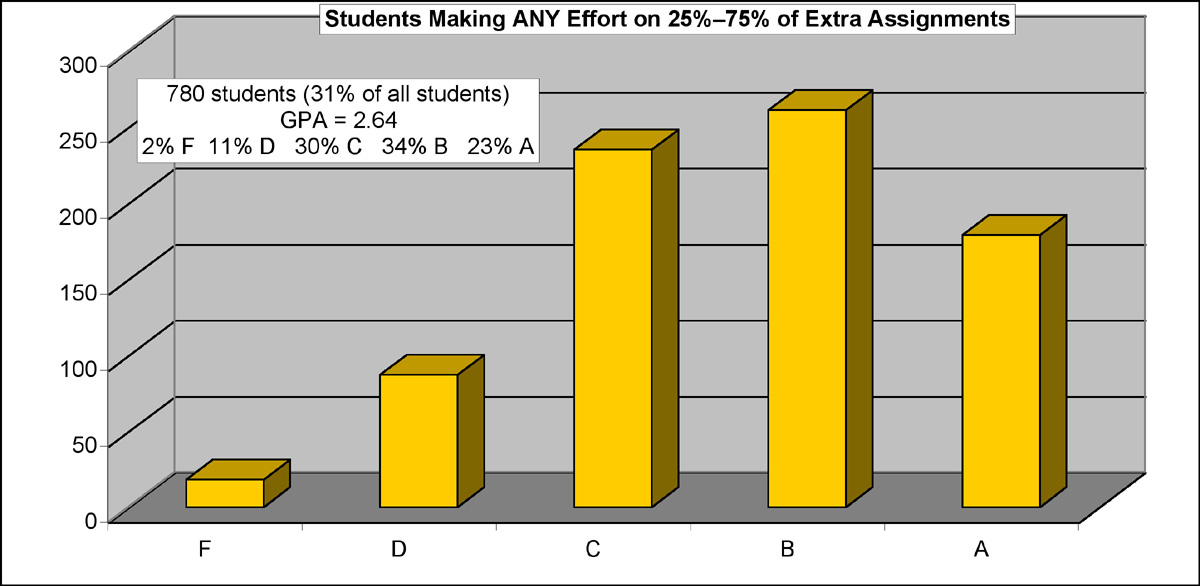
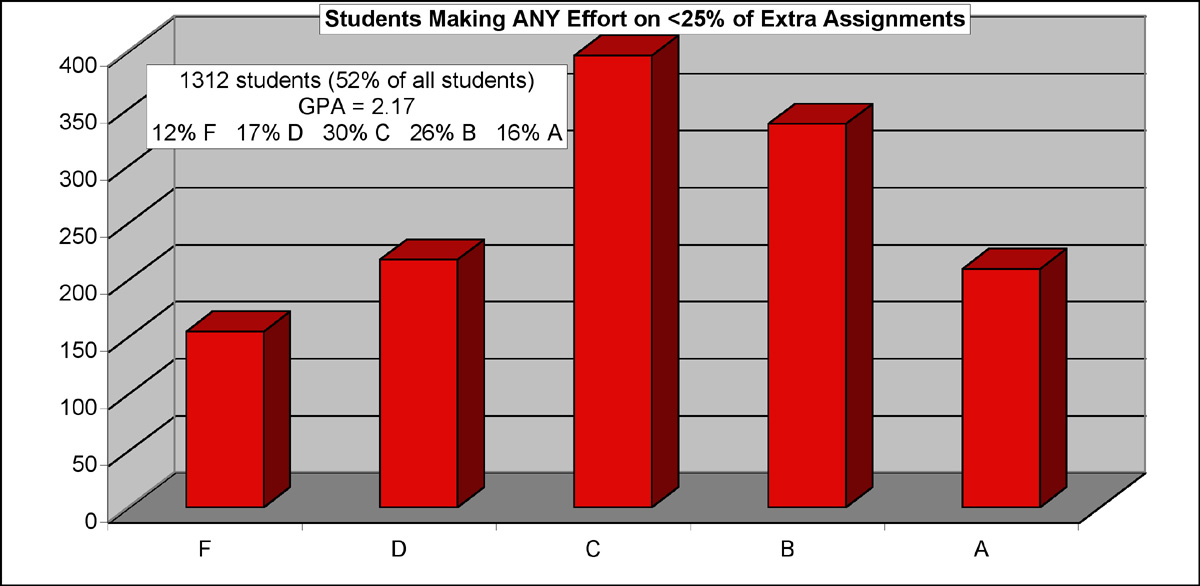
Some particular differences worth emphasizing:
-
More than HALF of students who make a Good effort to do extra homework earn A's in the course–or,
to put in another way: in this category, students earn more A's than
all other grades combined. The ratio of good grades (A's or B's) to
bad grades (D's or F's) is sixteen to one. Unfortunately, less than one student in
five chooses to be in this category.
-
Over half of all students make a Poor effort to do extra homework. These students earn 90% of all
F's and two thirds of all D's–meaning that these students are nine times likelier to
fail the course, and twice as likely to end up with only a D, when compared to the 48% of
students who make at least a Fair effort. [You have to wonder whether it's really
asking too much
to do extra homework, when the alternative may be to repeat the entire course, next semester.]
-
On the other hand, if you were to construct a
Not-Bad
category, involving the students making either a Good or Fair effort on the extra homework, you would find an overall 2.85 GPA, with a six to one ratio of good grades to bad grades.
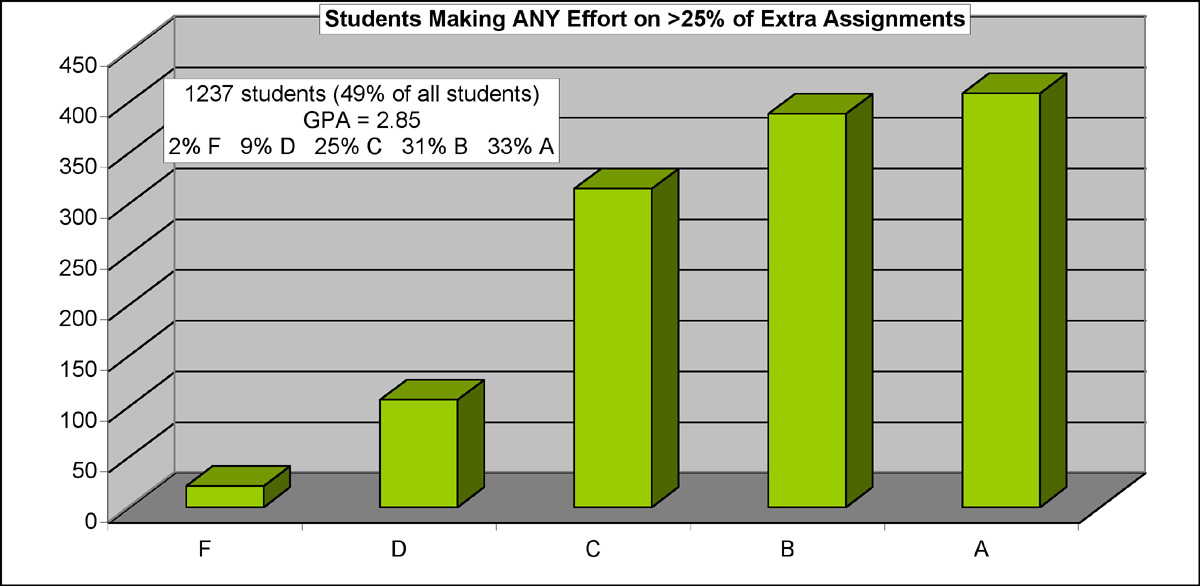
It is worth noting that the grade distribution for students who make a Not Bad
effort on the extra
homework is virtually identical to the distribution of grades for students who maintain a
Not Bad
attendance record. This suggests that the
cutoffs selected for both attendance and extra homework are not as arbitrary as one might suspect.
Effect on Test Scores
Ultimately the difference in grade distributions seen above can be traced to a pronounced difference in test performance—both on the quizzes during the term and on the final exam. For example, a breakdown of quiz averages for each category is shown below. Note that data was only included for those students taking ALL tests during the term; anyone who dropped the class (or who just gave up and quit taking tests) is not part of this survey.
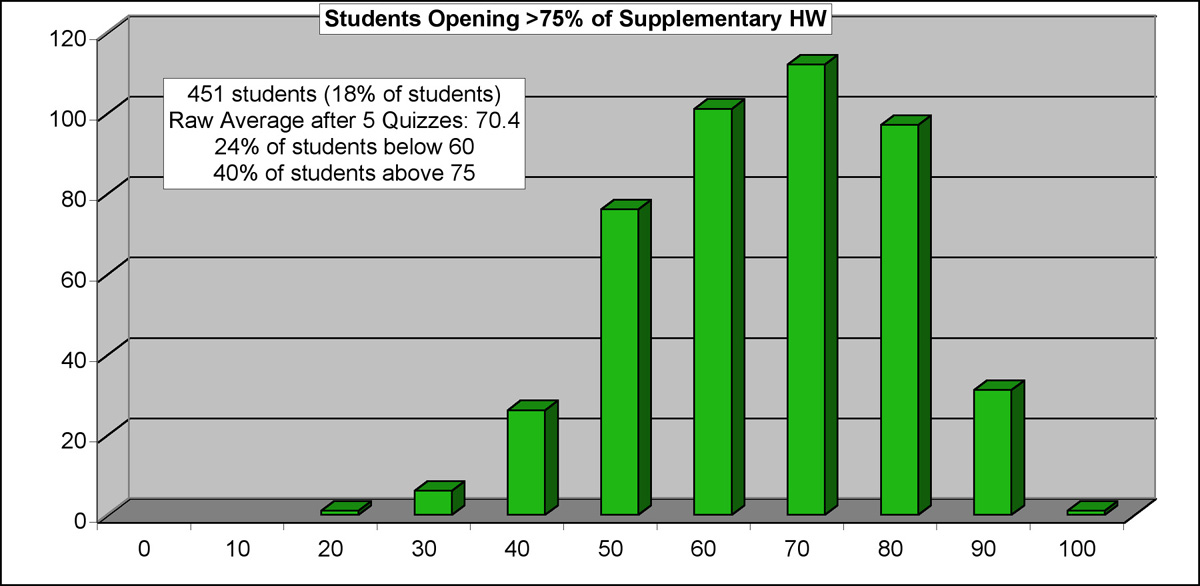
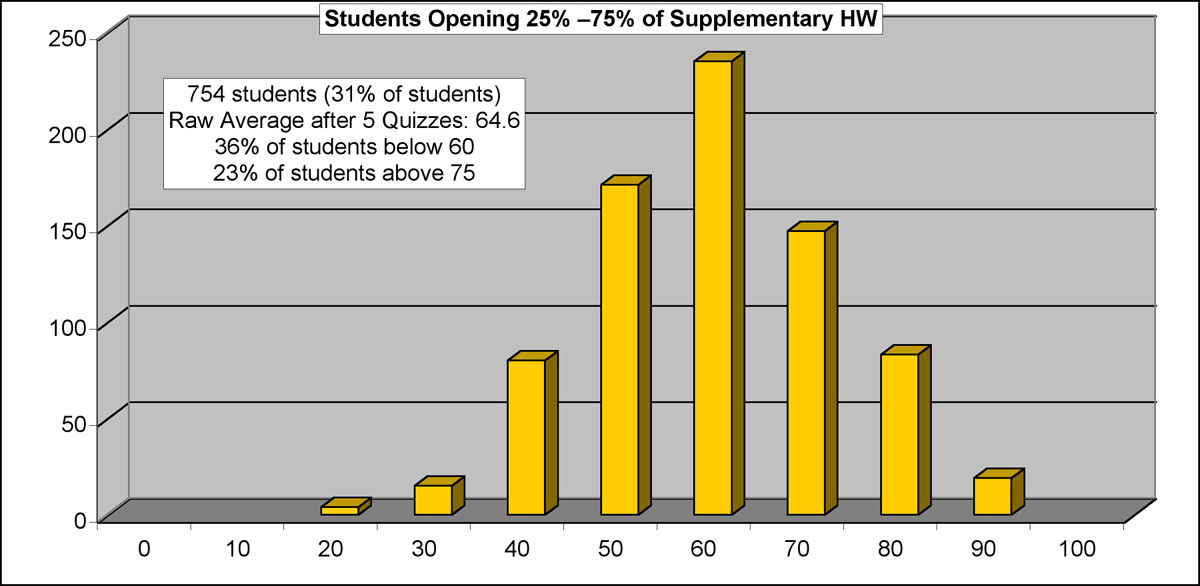
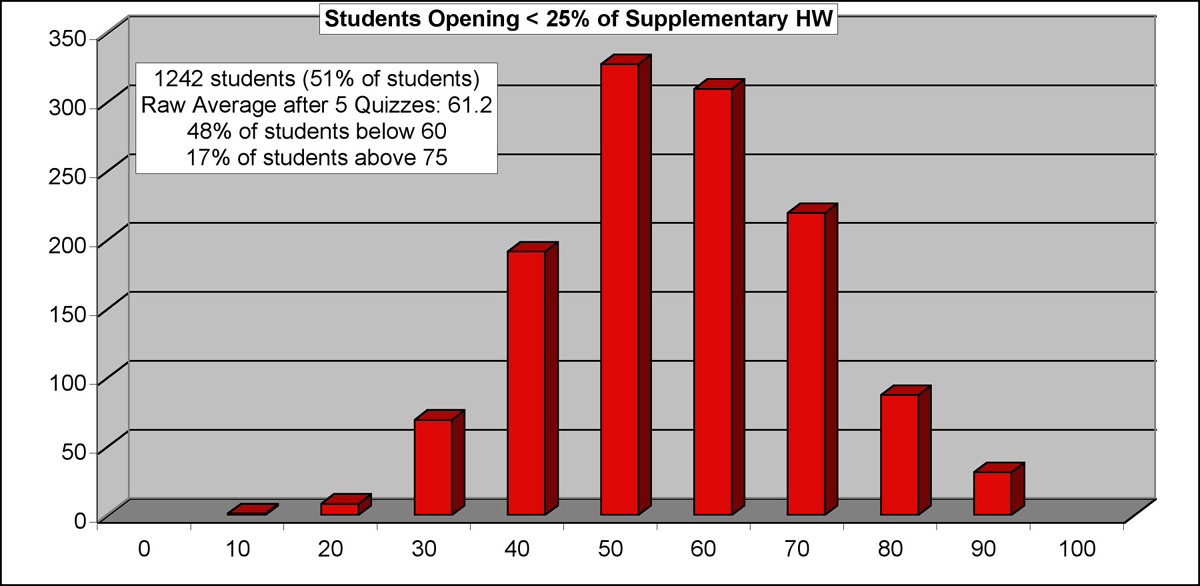
Once again, we see something very similar to the results of the attendance study; namely an average student who disregards the extra assignments can expect to score about ten points lower, per test than a student who makes a regular effort on the extra homework. Even at the high end, among the very best students–those who presumably don't need to do the extra homework—we find that test scores are three to four points lower for the students making a Poor effort.
More specifically:
-
Among those making a Good effort on extra homework, three quarters will end
up with test averages over 60. Assuming a typical effort in other areas (such as lab,
recitation, and attendance), a test average of 60 would earn a final grade of C. Of course,
students in this category are NOT
typical
, and in practice they generally score well above average in these other categories, which is why the actual percentage of C's or better is 95%, as seen in the letter-grade distributions above. Note what this means: among the 24% who might be expected (based on their test scores) to get a D or F, only 5% actually do end up with a poor grade–80% of the students whose quiz scores leave themat risk
will nevertheless manage to end up with a C or better.
-
For students making a Fair effort, the corresponding numbers are: 36% of test averages are
at risk
, but only 13% of students end up with D's or F's. The other 23% get C's or better, meaning that 64% of theat risk
students succeed.
-
For those making a Poor effort, almost half (48%) of all students have
at risk
test averages. At the end of the term, 29% have D's or F's while the other 19% have C's or better. Less than 40% of theseat risk
students will succeed.
If you disregard the extra homework, you will simultaneously (1) DOUBLE the likelihood of having poor test scores at the end of the term, and (2) HALVE the chances that you can overcome those test scores and end up with a C.
Conclusions & Cautions
Like it or not, the evidence above shows a clear correlation: the more effort you put into working
homework problems, the better-prepared you will be for the tests, and the better your final grade.
What's more, the data pretty convincingly shows that for most students, the required minimum
homework
is NOT enough. Students who ignore the extra homework assignments can expect to
score ten points lower on the quizzes and the final exam, and the end result can be expected to
be a letter grade lower...on average.
Sure–a small number of students can still earn A's without messing with the extra
homework, but keep this in mind: the GPA difference between Good and Poor effort is 1.06 letter
grades. This is the average difference per student. From above, we see that one in six
students making a Poor effort still earned A's; they clearly did not lose a letter grade
as compared to their counterparts who made a Good effort. The OTHER 84% of students making a Poor
effort must be the ones accounting for ALL of the 1.06 letter-grade difference. That averages
out to 1.26 letter grades lost per student, among the remainder.
Finally, keep in mind that working the extra homework
and doing the
extra homework
are NOT synonymous. (And of course this advice is applicable to the required
regular homework, as well...) If you are relying extensively on Word of some sort
to complete the homework with a reduced time expenditure, then of course you will see no benefit.
The purpose of homework is NOT to figure out the answers to specific problems.
If you approach the homework with such a mindset, then the effort you make—whether it is
Poor, Fair or Good—will have little practical benefit.
As you work the problems (assigned or extra), remember that the goal is to practice a technique,
not simply to get an answer. Specifically, you are supposed to be practicing a process whereby
a single, specific situation can be understood (not
answered
—understood)
in terms of general principles. By doing so, you are learning not just about the specific
problem, but about the general principles themselves. Knowing those general principles will in turn
allow you to understand a wide range of new
problems–in many cases, ones that are very
different from the original problem you started with. On the other hand, if you cut corners
in order to reduce the specific-to-general-to-specific learning process to a simpler
specific-to-specific memorization process, you will leave yourself unable to solve
anything
but a narrow range of nearly-identical problems.
